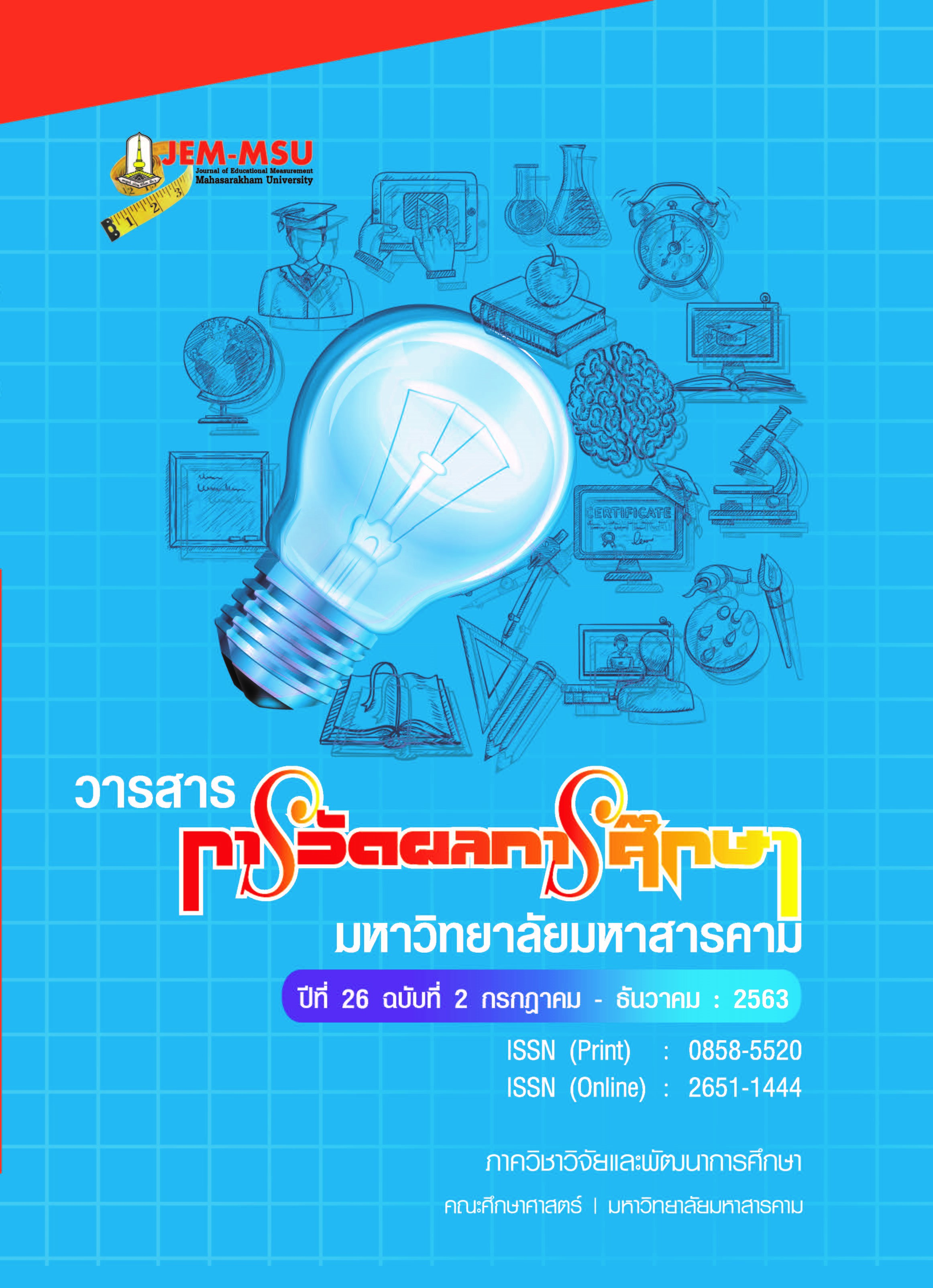The Development of a Monitoring and Assessment System on Desirable Characteristics of Primary Education Students in Schools under Local Administration Organizations
Main Article Content
Abstract
The purposes of this research were: (1) to develop a monitoring and assessment system on desirable characteristics of primary education students in schools under local administration organizations; and 2) to assess the quality of the developed system.The research process comprised two phases. Phase 1 was the development of a monitoring and assessment system on desirable characteristics of primary education students in schools under local administration organizations. The sample consisted of: 13 experts in system development, measurement and evaluation, and educational administration; 360 teachers and students from grade 1, 3 and 5 in schools under local administration organizations. The research instruments were the draft of monitoring and assessment system on desirable characteristics, a recording form for focus group discussion, consistency assessment form for the instruments, a quality assessment form for the draft of the system, a questionnaire inquiring opinions on the program, 3 student desirable characteristics observation forms for teachers, and a self-assessment form for grade 5 students. The data were collected from the focus group discussion. The four forms were tried out with the teachers and students in grade 1, 3 and 5 of schools under local administration organizations in order to examine the discrimination, structure validity and reliability of the instruments as well as how the program worked. Analysis of data employed content analysis, the mean and standard deviation. Phase 2 was an assessment of the monitoring and assessment system on desirable characteristics of primary education students in schools under local administration organizations. The sample consisted of 300 educational institution administrators, teachers and students. The research instruments were: the monitoring and assessment system on desirable characteristics, the system handbook, and a quality assessment form for the system. Analysis of data employed the mean, standard deviation, and content analysis.
The findings were as follows: 1) the system of monitoring and assessment on desirable characteristics that had been developed consisted of 5 components: (1) the inputs which comprised people, money, materials and information; (2) the process which consisted of defining the mission, taking stock, planning for the future of monitoring and assessment; (3) the outputs which were reports on desirable characteristics of each students and each behavior, and accreditation of desirable characteristics of primary education students; (4) the feedback which was a report on monitoring and assessment which indicated what to be improved and developed; and (5) the context which consisted of the 20-year National Strategy, the Twelfth National Economic and Social Development Plan, the National Education plan 2017-2036; and 2) the results of the quality assessment of the monitoring and assessment system on desirable characteristics of primary education students revealed that the system had its quality as required by the assessment as it had propriety, feasibility, and accuracy at a high level and utility at the highest level.
Article Details
The content and information contained in the published article in the Journal of Educational Measurement Mahasarakham University represent the opinions and responsibilities of the authors directly. The editorial board of the journal is not necessarily in agreement with or responsible for any of the content.
The articles, data, content, images, etc. that have been published in the Journal of Educational Measurement Mahasarakham University are copyrighted by the journal. If any individual or organization wishes to reproduce or perform any actions involving the entirety or any part of the content, they must obtain written permission from the Journal of Educational Measurement Mahasarakham University.
References
กระทรวงศึกษาธิการ. (2551). หลักสูตรแกนกลางการศึกษาขั้นพื้นฐาน พุทธศักราช 2551. กรุงเทพฯ : ชุมนุมสหกรณ์การเกษตรแห่งประเทศไทย.
ชาญณรงค์ พรรุ่งโรจน์. (2554). อุปนิสัยศึกษากับวิชาศึกษาทั่วไป. การบรรยาย วันที่ 8 มิถุนายน 2554. มหาวิทยาลัยสยาม, กรุงเทพฯ.
ณพัฐอร เฮงสมบูรณ์. (2557). การนำเสนอแนวทางการประเมินคุณลักษณะอันพึงประสงค์ของผู้เรียนจากการวิเคราะห์แนวปฏิบัติดี. วิทยานิพนธ์ปริญญาครุศาสตรมหาบัณฑิต สาขาวิชาวัดและประเมินผลการศึกษา บัณฑิตวิทยาลัย จุฬาลงกรณ์มหาวิทยาลัย.
รัญจวน คำวชิรพิทักษ์. (2557). พัฒนาการมนุษย์กับการแนะแนว. ใน เอกสารการสอนชุดจิตวิทยาและสังคมวิทยาพื้นฐานเพื่อการแนะแนว (หน่วยที่ 2, น. 1-61). นนทบุรี : มหาวิทยาลัย สุโขทัยธรรมาธิราช.
โรสนี จริยะมาการ, สุวิมล ว่องวาณิช และสร้อยสน สกลรักษ์. (2559). การสร้างความสามารถในการประเมินของครูเพื่อพัฒนาทักษะการสื่อสารภาษาไทยของนักเรียน โดยใช้แนวคิดประเมินแบบเสริมพลังอำนาจและกระบวนการสอนโดยใช้การประเมินเป็นฐาน : การศึกษารายกรณี. วารสารวิจัย มสด, 12(1), 73-92.
วิชัย ตันศิริ. (2550). อุดมการณ์ทางการศึกษา : ทฤษฎีและภาคปฏิบัติ. พิมพ์ครั้งที่ 2. กรุงเทพฯ : สามลดา.
สิทธิชัย เจริญพิวัฒนพงษ์. (2552). การพัฒนาระบบการประกันคุณภาพภายใน ตามแนวการบริหารงานแบบมุ่งคุณภาพทั่วทั้งองค์การ สำหรับโรงเรียนอนุบาลเอกชน. วิทยานิพนธ์ปริญญาครุศาสตรดุษฎีบัณฑิต สาขาวิชาบริหารการศึกษา บัณฑิตวิทยาลัย จุฬาลงกรณ์มหาวิทยาลัย.
สำนักวิชาการและมาตรฐานการศึกษา. (2553). แนวทางการพัฒนา การวัดและประเมินคุณลักษณะอันพึงประสงค์ ตามหลักสูตรแกนกลางการศึกษาขั้นพื้นฐาน พุทธศักราช 2551. กรุงเทพฯ : ชุมนุมสหกรณ์การเกษตรแห่งประเทศไทย.
Fetterman, D.M., Kaftarian, S.J. and A. Wandersman. (2015). Empowerment evaluation. 2nd ed. California : Sage.
Lunenberg, F.C. (2010). Schools as Open System. Schooling, 1(1), 1-5.
Rossi, P.H., Lipsey, M.W. and H.E. Freeman. (2004). Evaluation a systematic approach. 7th ed. California : Sage.
Stufflebeam, D.L. and others. (1981). Standard for evaluation of education programs, projects and materials.The Joint committee on standards for education evaluation. New York : McGraw-Hill.


